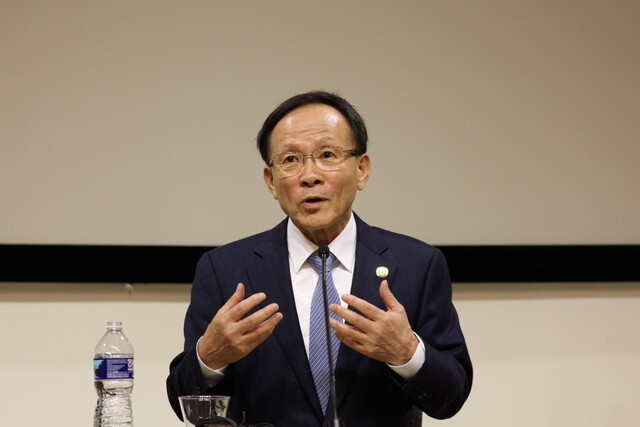hankyoreh
Links to other country sites 다른 나라 사이트 링크
Newly appointed S. Korean ambassador to US addresses SMA negotiations

Lee Soo-hyuck, the newly appointed South Korean ambassador to the US, said on Oct. 30 that South Korea would not be “dwelling” on the amount reportedly being demanded by the US in negotiations of the two sides’ shares of US Forces Korea defense costs.
Speaking that day with Korean correspondents at the Korean Cultural Center in Washington, DC, Lee said, “There’s been a lot of arguing back and forth about the scale of defense costs, but we’re only at the starting stages of negotiations, and I think there needs to be an analysis of how much weight we should be placing on the numbers the US is giving.”
“Since they’re demanding such large numbers, what we need to be doing is gauging their actual intentions in these negotiations,” he suggested. Rhee Cheol-hee, a lawmaker with the Democratic Party, recently told the National Assembly he had heard the US was demanding US$5 billion -- five times South Korea’s share for this year -- during ongoing negotiations for the two sides’ Special Measures Agreement (SMA) on defense costs.
“I’m not really sure what the amount the US is asking for actually means,” Lee said. “It hasn’t been defined yet in terms of whether they want that much for next year, two years from now, or all together over the next few years.”
“I don’t think the number has been defined clearly enough yet for us to figure out what it means,” he added.
Lee acknowledged that an increase appears inevitable, asking, “Why would working-level US officials agree to a number that falls way short of what President [Donald] Trump quotes when there’s a US presidential election next year?”
At the same time, he said, “I don’t think this is a situation that calls for us to gasp and dwell too much on the numbers [quoted by the US]. No one really believes those numbers are actually going to be seen through.”
When asked whether the US was asking for individual increases in areas such as strategic asset deployment costs, Lee said, “I don’t think it’s anything where it’s broken down item-by-item, with numbers like ‘this many million for this’ and ‘this many million for that.’”
On Mt. Kumgang tourism and denuclearization talks with N. KoreaOn the question of whether the Mt. Kumgang tourist project can be resumed, Lee said, “With North Korea demanding the demolition [of structures at the complex] right now, I don’t think it would be especially meaningful to talk about resuming the Mt. Kumgang tourism project.”
“I imagine the administration is focused at the moment on considering how to protect the intellectual property of South Korean companies and citizens in response to the demolition request,” he added.
Speaking about the future prospects for North Korea-US working-level talks on denuclearization following an Oct. 5 meeting in Sweden that ended without an agreement, Lee said, “Personally, I got the sense that the people actually involved in the negotiations may not actually view them as having ‘broken down.’”
“My own experience with nuclear negotiations has been that you can’t fixate on every high and low. North Korea has asked the US to come up with new terms by the end of December, and I think we may see another meeting before that,” he said.
Lee also commented on speculation that Stephen Biegun, the current US State Department special representative for North Korea and US representative at the working-level talks with North Korea, will become the next deputy secretary of state.
“I don’t see his becoming deputy secretary of state as presenting any problems,” he said.
“What I’m hearing is that Mr. Biegun intends to continue working on the North Korean nuclear issue even if he becomes deputy secretary,” he added.
By Hwang Joon-bum, Washington correspondent
Please direct comments or questions to [english@hani.co.kr]

Editorial・opinion
![[Column] Season 2 of special prosecutor probe may be coming to Korea soon [Column] Season 2 of special prosecutor probe may be coming to Korea soon](https://flexible.img.hani.co.kr/flexible/normal/500/300/imgdb/original/2024/0426/3317141030699447.jpg) [Column] Season 2 of special prosecutor probe may be coming to Korea soon
[Column] Season 2 of special prosecutor probe may be coming to Korea soon![[Column] Park Geun-hye déjà vu in Yoon Suk-yeol [Column] Park Geun-hye déjà vu in Yoon Suk-yeol](https://flexible.img.hani.co.kr/flexible/normal/500/300/imgdb/original/2024/0424/651713945113788.jpg) [Column] Park Geun-hye déjà vu in Yoon Suk-yeol
[Column] Park Geun-hye déjà vu in Yoon Suk-yeol- [Editorial] New weight of N. Korea’s nuclear threats makes dialogue all the more urgent
- [Guest essay] The real reason Korea’s new right wants to dub Rhee a founding father
- [Column] ‘Choson’: Is it time we start referring to N. Korea in its own terms?
- [Editorial] Japan’s rewriting of history with Korea has gone too far
- [Column] The president’s questionable capacity for dialogue
- [Column] Are chaebol firms just pizza pies for families to divvy up as they please?
- [Column] Has Korea, too, crossed the Rubicon on China?
- [Correspondent’s column] In Japan’s alliance with US, echoes of its past alliances with UK
Most viewed articles
- 1Why Kim Jong-un is scrapping the term ‘Day of the Sun’ and toning down fanfare for predecessors
- 2‘We must say no’: Seoul defense chief on Korean, USFK involvement in hypothetical Taiwan crisis
- 3After election rout, Yoon’s left with 3 choices for dealing with the opposition
- 4Two factors that’ll decide if Korea’s economy keeps on its upward trend
- 5BTS says it wants to continue to “speak out against anti-Asian hate”
- 6AI is catching up with humans at a ‘shocking’ rate
- 7Noting shared ‘values,’ Korea hints at passport-free travel with Japan
- 846% of cases of violence against women in Korea perpetrated by intimate partner, study finds
- 9Why Korea shouldn’t welcome Japan’s newly beefed up defense cooperation with US
- 10Ethnic Koreans in Japan's Utoro village wait for Seoul's help